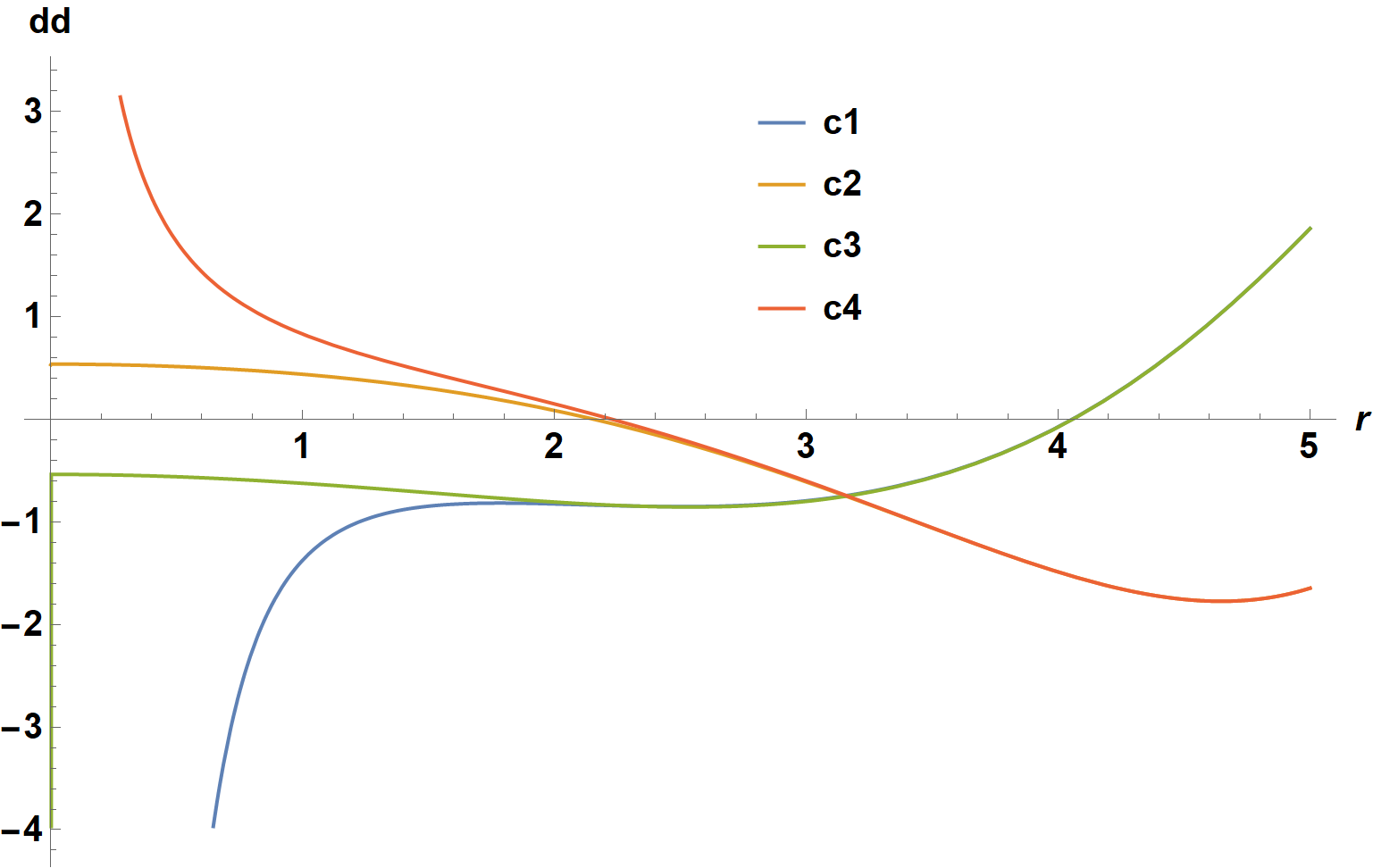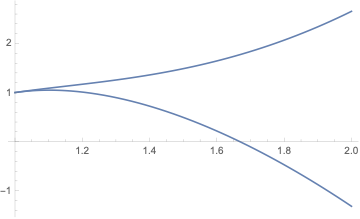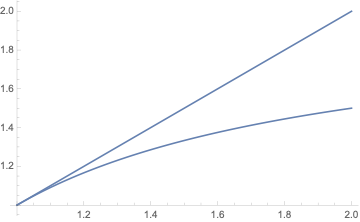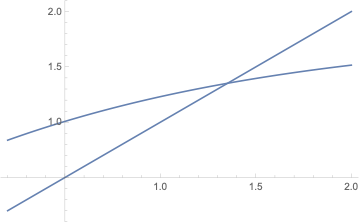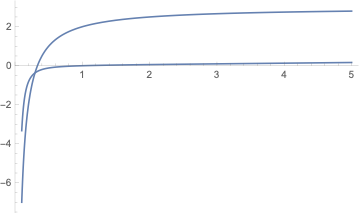Edited to derive simpler expression for dd
The symbolic solution requested in the Question is obtained as follows.
eq1 = Expand[(r^2*A''[r] + 2*r*A'[r] - 2 A[r] + lambda^2*r^2*A[r] +
2 lambda*r^2*dd'[r])/r^2];
(* lambda^2 A[r] - 2 A[r]/r^2 + 2 A'[r]/r + 2 lambda dd'[r] + A''[r] *)
eq2 = Expand[(r*dd''[r] + 2 dd'[r] + 3 lambda^2*r*dd[r] +
2 lambda*r*A'[r] + 4 lambda*A[r])/r];
(* (4 lambda A[r])/r + 3 lambda^2 dd[r] + 2 lambda A'[r] + 2 dd'[r]/r + dd''[r] *)
Combine the two expressions to obtain an expression for dd in terms of A
eqdd = -Subtract @@ First[Eliminate[{eq1 == 0, eq2 == 0, D[eq1, r] == 0},
{dd'[r], dd''[r]}]]
(* -6*lambda^2*A[r]/r - 6*lambda^3*dd[r] - 3*lambda^2*A'[r] + 4*A''[r]/r + A'''[r] *)
and an expression for A alone and solve it.
eqA = Subtract @@ First[Eliminate[{D[eqdd, r] == 0, eq1 == 0}, dd'[r]]]
(* 3*lambda^4*r*A[r] - 4*A''[r]/r + 4*A'''[r] + r*A''''[r] *)
sA = DSolveValue[eqA == 0, A[r], r]
(* (E^((-1)^(3/4) 3^(1/4) lambda r) (I + (-3)^(1/4) lambda r) C[1])/r^2
+ (E^((-3)^(1/4) lambda r) (-I + (-1)^(3/4) 3^(1/4) lambda r) C[2])/r^2
+ (E^(-(-1)^(3/4) 3^(1/4) lambda r) (-I + (-3)^(1/4) lambda r) C[3])/r^2
+ (E^(-(-3)^(1/4) lambda r) (I + (-1)^(3/4) 3^(1/4) lambda r) C[4])/r^2 *)
Finally, substitute A into eqdd and solve it.
sdd = Solve[Simplify[eqdd /. A -> Function[{r}, sA]] == 0, dd[r]][[1, 1]] // Values
(* -(1/(lambda r^3)) (E^((-1)^(3/4) 3^(1/4) lambda r) (I + (-3)^(1/4) lambda r) C[1] +
E^((-3)^(1/4) lambda r) (-I + (-1)^(3/4) 3^(1/4) lambda r) C[2] +
E^(-(-1)^(3/4) 3^(1/4) lambda r) (-I + (-3)^(1/4) lambda r) C[3] +
E^(-(-3)^(1/4) lambda r) (I + (-1)^(3/4) 3^(1/4) lambda r) C[4]) *)
as requested.
Addendum: Eliminating complex numbers from the solution.
It often is desirable not to have complex numbers in the solutions of real ODEs. This can be accomplished by converting exponentials to trigonometric and hyperbolic functions, performing a complex expansion, and replacing the existing constants of integration by constants that absorb the complex numbers.
sA1 = Collect[ComplexExpand@ExpToTrig@sA, {r, Cos[_] Cosh[_], Cos[_] Sinh[_],
Sin[_] Cosh[_], Sin[_] Sinh[_]}, Simplify];
Cases[sA1, Cos[_] Cosh[_] z_ | Sin[_] Cosh[_] z_ | Cos[_] Sinh[_] z_ |
Sin[_] Sinh[_] z_ -> z, Infinity, 4];
cf = Solve[Thread[{c1, c2, c3, c4} == %], {C[1], C[2], C[3], C[4]}] // Flatten;
sA2 = Collect[sA1 /. cf, {r, Cos[_] Cosh[_], Cos[_] Sinh[_], Sin[_] Cosh[_],
Sin[_] Sinh[_]}, Simplify]
(* (1/(r^2))(c1 Cos[(3^(1/4) lambda r)/Sqrt[2]] Cosh[(3^(1/4) lambda r)/ Sqrt[2]] +
c2 Cosh[(3^(1/4) lambda r)/Sqrt[2]] Sin[(3^(1/4) lambda r)/Sqrt[2]] +
c3 Cos[(3^(1/4) lambda r)/Sqrt[2]] Sinh[(3^(1/4) lambda r)/ Sqrt[2]] +
c4 Sin[(3^(1/4) lambda r)/Sqrt[2]] Sinh[(3^(1/4) lambda r)/Sqrt[2]]) +
(1/r)(-((3^(1/4) (c2 + c3) lambda Cos[(3^(1/4) lambda r)/Sqrt[2]] Cosh[(
3^(1/4) lambda r)/Sqrt[2]])/Sqrt[2]) +
(3^(1/4) (c1 - c4) lambda Cosh[(3^(1/4) lambda r)/Sqrt[2]] Sin[(
3^(1/4) lambda r)/Sqrt[2]])/Sqrt[2] -
(3^(1/4) (c1 + c4) lambda Cos[(3^(1/4) lambda r)/Sqrt[2]] Sinh[(
3^(1/4) lambda r)/Sqrt[2]])/Sqrt[2] -
(3^(1/4) (c2 - c3) lambda Sin[(3^(1/4) lambda r)/Sqrt[2]] Sinh[(
3^(1/4) lambda r)/Sqrt[2]])/Sqrt[2]) *)
sdd2 = Collect[ComplexExpand@ExpToTrig@sdd /. cf, {r, Cos[_] Cosh[_],
Cos[_] Sinh[_], Sin[_] Cosh[_], Sin[_] Sinh[_]}, Simplify]
(* (1/(r^2))((3^(1/4) (c2 + c3) Cos[(3^(1/4) lambda r)/Sqrt[2]] Cosh[(
3^(1/4) lambda r)/Sqrt[2]])/Sqrt[2] +
(3^(1/4) (-c1 + c4) Cosh[(3^(1/4) lambda r)/Sqrt[2]] Sin[(
3^(1/4) lambda r)/Sqrt[2]])/Sqrt[2] +
(3^(1/4) (c1 + c4) Cos[(3^(1/4) lambda r)/Sqrt[2]] Sinh[(
3^(1/4) lambda r)/Sqrt[2]])/Sqrt[2] +
(3^(1/4) (c2 - c3) Sin[(3^(1/4) lambda r)/Sqrt[2]] Sinh[(
3^(1/4) lambda r)/Sqrt[2]])/Sqrt[2]) +
(1/(r^3))(-((c1 Cos[(3^(1/4) lambda r)/Sqrt[2]] Cosh[(3^(1/4) lambda
r)/Sqrt[2]])/lambda) -
(c2 Cosh[(3^(1/4) lambda r)/Sqrt[2]] Sin[(3^(1/4) lambda
r)/Sqrt[2]])/lambda -
(c3 Cos[(3^(1/4) lambda r)/Sqrt[2]] Sinh[(3^(1/4) lambda
r)/Sqrt[2]])/lambda -
(c4 Sin[(3^(1/4) lambda r)/Sqrt[2]] Sinh[(3^(1/4) lambda
r)/Sqrt[2]])/lambda) *)
For convenience, the solutions can be plotted for one non-zero c at a time.
Plot[Evaluate[Replace[sA2, {{c1 -> 1}, {c2 -> 1}, {c3 -> 1}, {c4 -> 1}}, Infinity]
/. {c1 -> 0, c2 -> 0, c3 -> 0, c4 -> 0, lambda -> 1}], {r, 0, 5},
ImageSize -> Large, AxesLabel -> {r, A}, LabelStyle -> {15, Bold, Black},
PlotLegends -> Placed[{c1, c2, c3, c4}, {.3, .8}]]
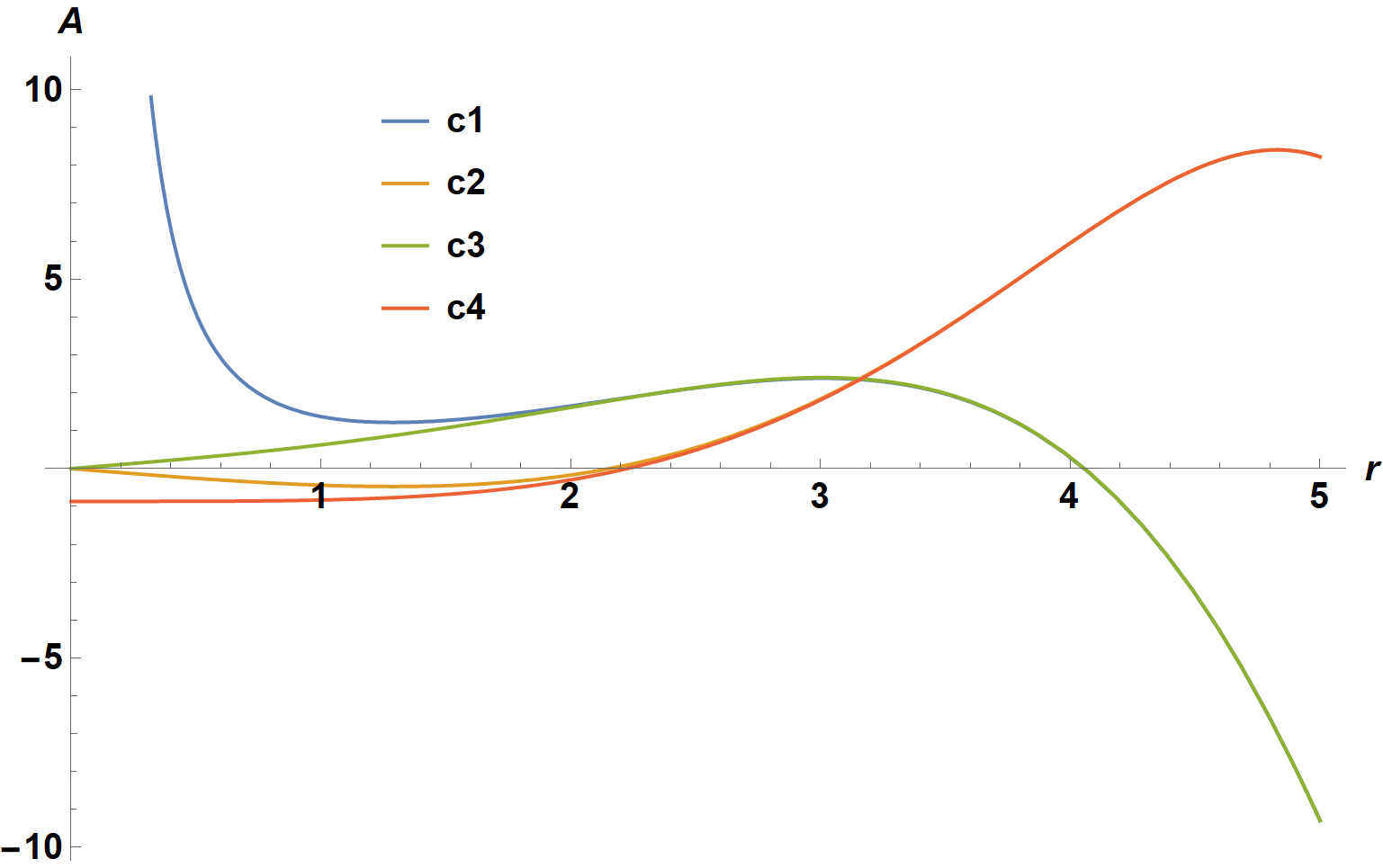
Plot[Evaluate[Replace[sdd2, {{c1 -> 1}, {c2 -> 1}, {c3 -> 1}, {c4 -> 1}}, Infinity]
/. {c1 -> 0, c2 -> 0, c3 -> 0, c4 -> 0, lambda -> 1}], {r, 0, 5},
ImageSize -> Large, AxesLabel -> {r, dd}, LabelStyle -> {15, Bold, Black},
PlotLegends -> Placed[{c1, c2, c3, c4}, {.6, .8}]]
